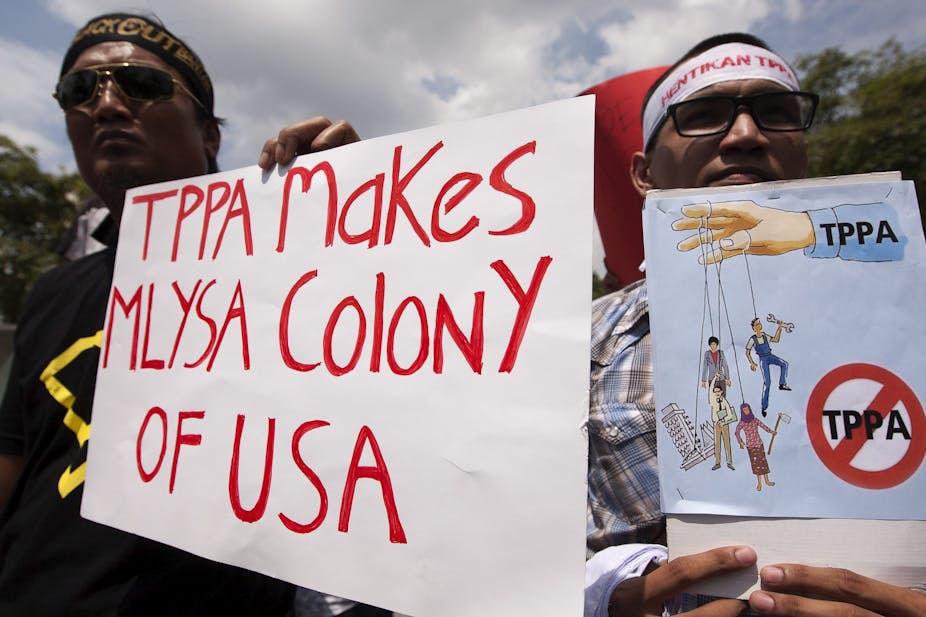The public’s intellectual property rights will continue to be impeded if Australia signs on to the Trans Pacific Partnership agreement as it stands, according to copyright and patent experts following the leaking of a key document by Wikileaks.
The experts also say parts of the text, including proposals supported by Australia, do not reflect the domestic Copyright Review process and previous recommendations made by parliamentary inquiries.
Margaret McKenzie, a lecturer in economics at Deakin University, said the agreement would see Australians worse off. She said it was an attempt by copyright owners to capture profit, particularly with more restrictions on internet users.
“These companies want to preserve the higher prices they can charge outside the US for software, books and other products. This agreement entrenches that and takes national control of these things out of the hands of individual countries,” she said.
Ostensibly a regional trade deal, the TPP will have widespread implications for environmental regulation, the Pharmaceutical Benefits Scheme and plain packaging for cigarettes, among other issues.
These fresh concerns follow the leaking of the controversial intellectual property rights chapter last night. The document shows a softening of US demands in some parts of negotiations related to patentability, while it maintains aggressive posture in most other areas.
An earlier draft showed the US wanted patents for “new forms” of known substances, a proposal which would have seen medical patents being renewed if drugs were offered as liquids instead of tablets.
But with the support of Australia, the US is still pushing for patents on new uses for old medicines, which Deborah Gleeson, from La Trobe’s School of Public Health said would lead to “evergreening”, where patents can be renewed continuously.
All other parties, with the exception of Japan which is considering the clause, oppose the rule.
The document highlights a series of disagreements between the US and other participants that remain unresolved even as leaders attempt to complete negotiations by the end of the year.
“Most of the other countries, including Australia, are not agreeing to these extreme demands,” said Dr Gleeson. “But I’m disappointed to see Australia support the proposal for the granting of patents for new uses of existing products.”
“It’s very bad for countries like Vietnam where there is already a significant problem with access to medicine.”
Copyright contradictions in Australian position
Angela Daly, a researcher on communication law at Swinburne, said the chapter showed Australian support for many “self-defeating or absurd provisions”, including US opposition for copyright protection to be determined according to domestic law and international treaties.
In other instances, Australia has sided with the US opposing a proposal that would allow the circumvention of technology that restricts products to certain regions, even though this was recommended by the federal parliament’s Inquiry into IT Pricing.
Australia also supports a US proposal that would force ISPs to cooperate with copyright holders and terminate the accounts of repeat infringers, contrary to the opinion of the High Court that an ISPs inaction could not be taken as authorisation of a copyright infringement.
But Australia supports the parallel importation of goods made under authorisation in other countries, a measure the US opposes.
Dr McKenzie said Australia had already removed parallel importation restrictions on software, and copyright holders were reliant on technological barriers like geoblocking to maintain higher prices in Australia.
The highly secretive negotiations have been plagued by leaks, including of an earlier version of the intellectual property chapter last year, and the release of the entire investment chapter.
And bias toward corporate interests has long been claimed by activists, upset that talks are being conducted without the scrutiny of the US Congress or the Australian parliament.
Ms Daly said consumer organisations and other civil society groups have been locked out of the negotiations while documents are regularly circulated to corporate lobbyists.
Coalition back tracks (a little) on ISDS exclusion

There have also been long-held concerns about the investor-state dispute settlement (ISDS) provisions, which would allow companies from other countries to challenge government regulations on industrial relations or the environment.
It is these clauses – in a previous trade deal struck with Hong Kong – that tobacco companies are basing many of their arguments against plain packaging regulations on.
The previous government had said it would no longer sign trade agreements with these provisions, a policy ditched by the Coalition during the election.
But while the Abbott government and Australian business leaders are more open to ISDS provisions, trade minister Andrew Robb has signalled he will continue to oppose them during TPP negotiations.
Dr Gleeson is worried that the rush to complete negotiations at the end of the year – the next round of talks is scheduled for early December – will see politically motivated trade-offs rather than sound long-term decisions.
“Rather than making decisions about patents and medicines for sound policy reasons, we could see trade-offs for things like access to US markets for sugar in exchange for agreeing to some of their proposals,” she said.
The Conversation takes a closer look at the Trans Pacific Partnership in a series that begins tomorrow. You can find further articles about the TPP here.

